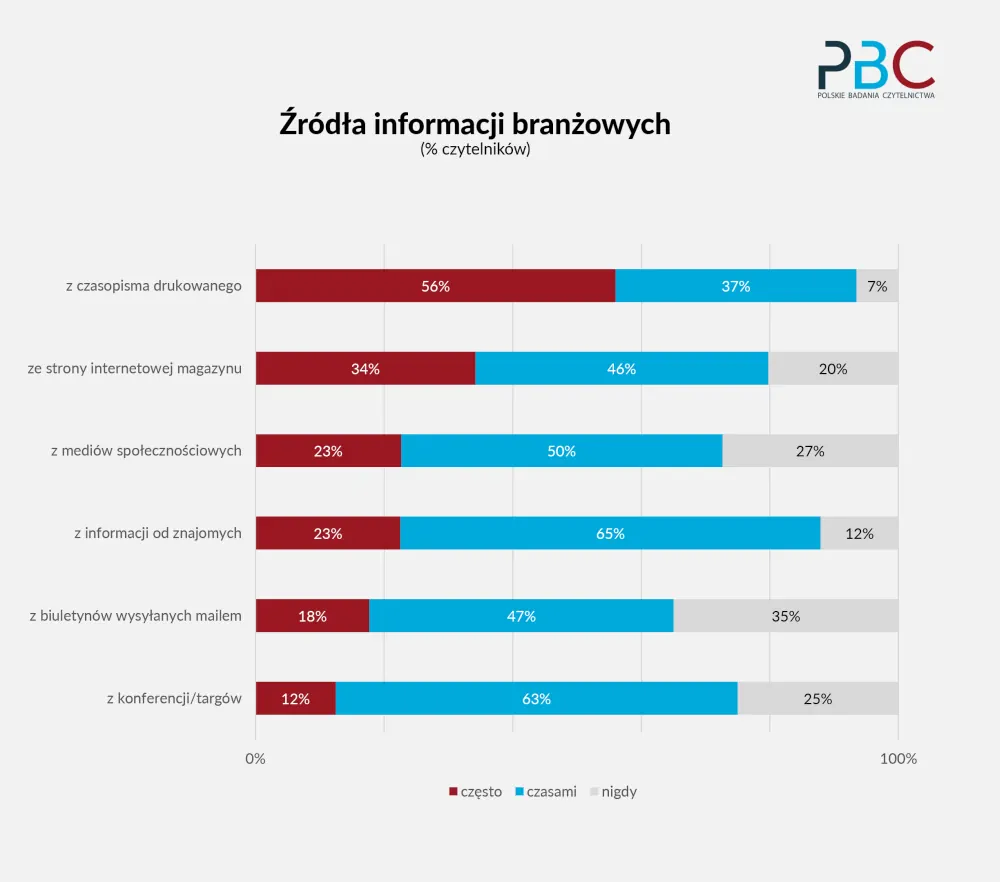 illustration: bing.com/create
illustration: bing.com/createInterest in industry press is shown not only by professionals seeking current knowledge but also by advertisers, for whom it is a well-targeted communication channel with potential clients. Industry titles ensure almost 100% certainty of reaching a full audience of professionals in a given industry, which is a unique characteristic of this category of media. It is an attractive marketing channel, especially for businesses offering B2B services and products.
Readers of industry press are not only people performing specific jobs; they are also individuals keenly interested in developing their skills and knowledge. Industry press is read thoroughly and intensely.
- 91% of readers claim they have read professional titles for 3 years or longer.
- A staggering 81% of people return to previously read issues of magazines at least two times or more.
- 70% of readers share the magazine with others. For respondents, it is an important, key, and primary source of information.
The dominant form of distribution is printed titles received directly at work or home. They serve as the main source of information for professionals. Reading industry magazines allows one to stay updated on professional topics; the knowledge gained from these publications encourages further information searches and discussions with acquaintances. As many as 93% of readers rate industry publications as high quality.
 source: PBC
source: PBCMore than 40% of readers take further actions after reading advertisements - they search for additional information online, visit physical or online stores, want to try the product or service, and consider purchasing it.
When choosing products, readers of industry magazines primarily consider high quality; price, customer reviews, brand recognition, and innovation are also important factors in their decisions.
Research partners: Inżynier Budownictwa, Ogólnopolskie Pismo Rynku FMCG Hurt & Detal, Szef Kuchni Magazyn Branży Gastronomicznej, Top Agrar Polska, Tygodnik Poradnik Rolniczy, Wieści Rolnicze, Zawód: Architekt.
The research was conducted from May to June 2024 using an online questionnaire. It was carried out among readers of industry magazines and supplemented with data from the PBC Audit regarding the distribution forms of industry titles.
The detailed report on the conducted research can be found here: https://www.pbc.pl/czytelnictwo-pism-branzowych-2024/
COMMERCIAL BREAK
New articles in section Media industry
Freelancers 2025 in media and advertising. Useme report
Krzysztof Fiedorek
The modern media and communication market presents entirely new challenges for independent creators. Traditional services are giving way to more complex forms of messaging. The most popular industries in which Polish freelancers operate focus on companies' online presence and visual content.
Video content in Poland. What and how we watch
Paweł Sobczak
Video content is watched remotely, but streaming services are mainly enjoyed in the comfort of home. This is how the consumption of audiovisual content by Poles in 2025 can be summarized. This is the result of an analysis of a study conducted by SW Research and data from the company MEGOGO.
How artificial intelligence misrepresents the news. PBC analysis
Sylwia Markowska
In news summaries generated by the most popular models in Polish, as many as 46% of responses contained at least one significant error, 27% had serious issues with sources (missing, misleading, or incorrect), and 19% contained hallucinations and outdated information.
See articles on a similar topic:
How Journalists Use Social Media
Bartłomiej Dwornik
Primarily, they seek inspiration from blogs and, less frequently, from Facebook. They rarely trust what they find, often approaching it with caution. Credibility does not necessarily correlate with attractiveness.
Paid journalistic content. Market trends and forecasts by Reuters Institute
Krzysztof Fiedorek
Only 18 percent of internet users pay for online news access, and the rate has not increased for the third year in a row. Norway sets records with 42%, while Greece does not exceed 7%. Globally, nearly one in three subscribers cancels after a year.
E-commerce Forecasts in Poland. Trends for 2024 and Beyond
Krzysztof Fiedorek
In 2024, e-commerce in Poland is reaching new heights, with an increasing number of consumers regularly shopping online. The report "E-shopping Habits of Poles 2024," prepared by SAMOSEO analysts, analyzes current trends and forecasts the industry's near future.
Global Media Under Scrutiny. Reuters Institute Digital News Report 2024
Krzysztof Fiedorek
The “Digital News Report 2024,” developed by the Reuters Institute for the Study of Journalism, describes the landscape of digital news media based on data from 47 markets, representing more than half of the world’s population.





























